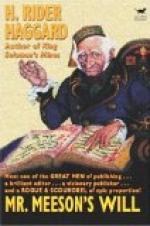“Very well, Miss. What is it to be, old gentleman? Cut it short, you know.”
“‘I leave all my property to Eustace H. Meeson,’ that’s as short as I can get it; and, if properly witnessed, I think that it will cover everything,” said Mr. Meeson, with a feeble air of triumph. “Anyhow, I never heard of a will that is to carry about two millions being got into nine words before.”
Bill poised his fishbone, and, next second, Augusta gave a start and a little shriek, for the operation had begun.
“Never mind, Miss,” said Bill, consolingly; “you’ll soon get used to it.”
After that Augusta set her teeth and endured in silence, though it really hurt her very much, for Bill was more careful of the artistic effect and the permanence of the work than of the feelings of the subject. Fiat experimentum in corpore vili, he would have said had he been conversant with the Classics, without much consideration for the corpus vile. So he pricked and dug away with his fishbone, which he dipped continually in the cuttle-ink, and with the sharp piece of wood, till Augusta began to feel perfectly faint.
For three hours the work continued, and at the end of that time the body of the will was finished—for Bill was a rapid worker—being written in medium-sized letters right across her shoulders. But the signatures yet remained to be affixed.
Bill asked her if she would like to let them stand over till the morrow?—but this, although she felt ill with the pain she declined to do. She was marked now, marked with the ineffaceable mark of Bill, so she might as well be marked to some purpose. If she put off the signing of the document till the morrow, it might be too late, Mr. Meeson might be dead, Johnnie might have changed his mind, or a hundred things. So she told them to go on and finish it as quickly as possible, for there was only about two hours more daylight.
Fortunately Mr. Meeson was more or less acquainted with the formalities that are necessary in the execution of a will, namely: that the testator and the two witnesses should all sign in the presence of each other. He also knew that it was sufficient, if, in cases of illness, some third person held the pen between the testator’s fingers and assisted him to write his name, or even if someone signed for the testator in his presence and by his direction; and, arguing from this knowledge, he came to the conclusion—afterwards justified in the great case of Meeson v. Addison and Another—that it would be sufficient if he inflicted the first prick of his signature, and then kept his hand upon Bill’s while the rest was done. This accordingly, he did, clumsily running the point of the sharp bone so deep into the unfortunate Augusta that she fairly shrieked aloud, and then keeping his hand upon the sailor’s arm while he worked in the rest of the signature, “J. Meeson.” When it was done, the turn of Johnnie came. Johnnie had at length aroused




